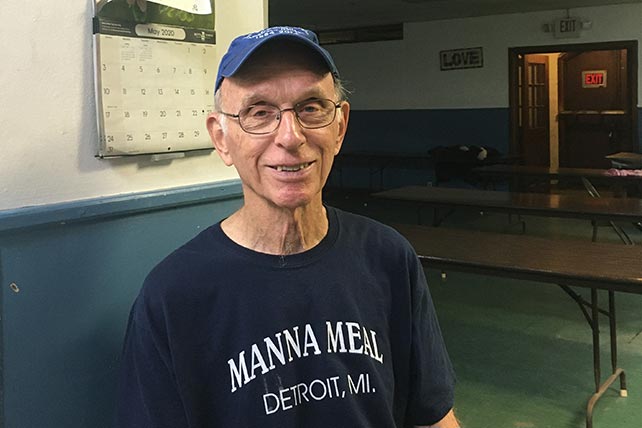(RNS) — Early on a Friday morning, men and women walk, drive or ride electric scooters to the parking lot of St. Peter’s Episcopal Church in Detroit’s Corktown neighborhood. For the past 45 years, they could count on finding the Rev. Tom Lumpkin there, from 8 to 9 every morning except Thursday and Sunday, serving hot coffee and breakfast items, passing out lunches.
On a recent morning in July, the indoor dining room was closed, as it has been since the start of the pandemic. But volunteers passed out bags of sandwiches and coffee or tea in Styrofoam vessels somewhere between a cup and bowl. The line serves around 50 people each morning, providing them with lunch for the rest of their day.
In partnership with a local church, Lumpkin and three companions founded the Manna Meal soup kitchen in 1976, launching their Catholic Worker community.
The Catholic Worker Movement, founded in 1933 by Dorothy Day and Peter Maurin — two committed Catholics: one a journalist and one a scholar — was an attempt to answer the question as old as Christianity: How can the Christian believer live justly in society?
“My claim to fame is that I’m the only diocesan priest in the world who has as his diocesan assignment the Catholic Worker Movement,” said Lumpkin, who was assigned to a Catholic Worker house by his bishop.
Lumpkin first encountered the Catholic Worker Movement during his years in seminary, when he heard Day speak at a conference.
Lumpkin said his calling to work with the poor began soon after, when he was traveling through Europe as a young seminarian. He was sent to the University of Louvain in Belgium to continue his theological studies from 1960 to ’64. The seminarians were encouraged to travel during their breaks. Lumpkin said he saw the continent still struggling with the aftermath of World War II.
“It was my first exposure to poverty. I was in Naples and saw people living in refrigerator boxes. I saw homeless people,” he said.
Lumpkin was so impacted by the experience he said he spent his final year of seminary measuring his food intake.
When Lumpkin was ordained, he was assigned to suburban parishes for nine years. But he felt restless.
“I began to feel like I was in danger of becoming too settled in my life as a priest and becoming too comfortable in my lifestyle,” Lumpkin said. He felt called to be closer to the sort of poverty he witnessed in Europe. He asked to be transferred from the suburbs to an urban parish. But even there, he wasn’t at peace.
In the early ’70s, a friend told him, “You know, what you’re looking for is the Catholic Worker Movement.” Lumpkin said that in response, a light turned on inside him.
And so, after rounding up a critical mass of interested folks, he and three companions opened a house of hospitality in the Corktown neighborhood. A previous Catholic Worker community had operated in the neighborhood from the late 1930s to the mid-1960s. Lumpkin’s community opened their soup kitchen at Most Holy Trinity Church in 1976 and moved up the road to St. Peter’s soon after.
Lumpkin and his fellow original workers traveled out west to visit a dozen houses of hospitality from Chicago to Los Angeles to discern how they were going to create their own Catholic Worker community in Motor City. “A lot of the practical questions that we needed answers to, that you couldn’t find in a book on the Catholic Worker, we answered ourselves.”

